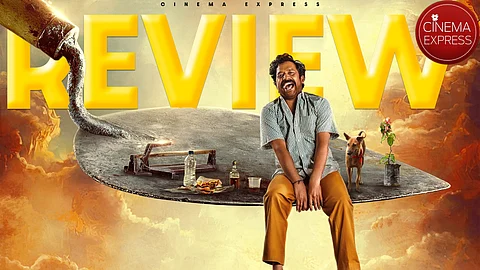

Powerful and ever-pertinent theme, deeply evocative performances, and earnest devotion to its craft and message. Bottle Radha is built of several charming qualities. This story about an alcoholic self-saboteur and the disintegration of his respect, sense of self, and family, is told through an uncompromising yet empathetic lens. Radha Mani has an indulgent grip on alcohol and in return, the bottle pulls him into a life of pitiable decadence. Alcohol is just the instigator, however, as Radha seems to have no remorse for his actions, and is seen being violent and rude to his wife even when he is sober. It is a commendable effort to show the dark depths of your protagonist while also maintaining a mature level of empathy for the character. With a perfect confluence of several such elements, Bottle Radha still struggles with one primordial aspect of storytelling: impact.
Director: Dhinakaran Sivalingam
Cast: Guru Somasundaram, Sanchana Natarajan, Maaran, John Vijay
However, Bottle Radha excels in getting sharp emotional responses out of us. When Radha’s wife Anjalam gets disrespected in public after her husband’s drunk antics, we feel her deep pang of shame and despair. When Radha begs her to come back, we understand his desperation and remorse. Guru Somasundaram as Radha Mani wonderfully demonstrates the different shades of being drunk, the gleeful indulgence that predates the moments before taking the first sip of alcohol, the spike in ego once drunk, and the soul-decaying despair that comes after sober realisation. Even as you travel with Radha Mani throughout the film, his wife Anjalam, played by Sanchana Natarajan remains the most impactful character of Bottle Radha. As the person affected the most by Radha Mani’s actions, Anjalam goes through a sea of intense emotions and both the heft and minutiae of her tribulations are wonderfully captured by Sanchana.
Since the film deals with a complex network of heavy themes, from addiction to domestic abuse and the hierarchy of power, the decision to handle the first half of the film in a mostly light-hearted manner is understandable. Except for Lollu Sabha Maaran’s zingers, the humour barely works. Bottle Radha becomes significantly more engaging when it sheds the need to coat itself with the armour of humour in the second half. The film is dotted with several interesting characters, from the paranoid addict in the rehabilitation centre to the founder of the rehabilitation centre, and an unapologetic drunk. As we wish to find out more about them, the film quickly resolves their character arcs in its eagerness to end on a hopeful note. There are several such moments that are entertaining on their own but leave us confused when they culminate as a whole. Are we supposed to laugh at the paranoid addict when he goes through a severe manic episode? Can the founder, who is shown as a beacon of empathy, really be oblivious to the brutal and dehumanising things happening in his centre? He does reprimand his employee but that does not seem enough. Why do we see a relationship bloom in the rehab centre? However, the film's unwavering focus on its intent, which is to demonstrate the evils of alcoholism, mostly drowns our other concerns. Dhinakaran Sivalingam is impressive with how he deftly handles storytelling both explicitly and subtly. The fact that Radha’s descent into addiction is nudged forward by apparent well-wishers is subtly hinted at, like when his uncle coaxes him into fighting an innocent ice cream vendor.
Bottle Radha is a sincere effort to dissect the mechanism and destructive force of addiction, built through several impressive elements brought together by the director. However, we don’t connect with Radha Mani as much as we pity or empathise with him. His slow and arduous climb out of depression after his phenomenal fall is captivating to watch but we don’t hope for his redemption with zeal. Radha Mani lacks the captivating appeal of a protagonist. A character can have abundant flaws, barely any redeeming qualities, completely good or completely evil, or unabashedly grey, and still be interesting. Radha Mani, even with his intricate characterisation, struggles in that regard. However, the biggest shortcoming of the film is how it perfectly builds itself with one perfect story element after another, only to culminate in a didactic ending. Radha Mani making peace with the consequences of his actions and walking away after leaving a heartfelt appeal to Anjalam, without expecting an answer in return, was a much better ending than the final scene where Anjalam gives out a monologue on the ill effects of alcoholism. In its pursuit to serve a hopeful conclusion, Bottle Radha drowns itself in didacticism.